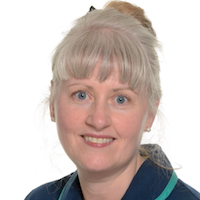This insightful video is for anyone considering applying for a career as a Specialist Nurse. Experienced nurse and NHS Recruitment & Retention Lead Carol shares her top tips on securing your dream role, from getting to know Specialist Nurses in your chosen field, to preparing your CV and backing up your professional development with relevant courses.
Hi everybody. My name's Carol and I'm a Recruitment & Retention Nurse Lead in Oxford. I'm passionate about nurses’ career development and support, and I provide career conversations as part of my role, to a wide range of nurses at different stages of their career. And that includes nurses who aspire to become a Specialist Nurse.
Nurses.co.uk have asked me to give you some advice and some key tips on how to become a specialist nurse, and I'll be presenting some of these tips to help you along your career journey.
There Are Many Career Pathways For Specialist Nurses to Choose
So, you might be looking at a range of different Specialist Nurse career pathways, or you might know exactly the type of Specialist Nurse you wish to become or just have the specialist nursing area that you're interested in.
For example, you could be interested in neurosciences as a specialist area generally, but there's lots of different specialist role nurses in that area. Multiple Sclerosis Specialist Nurse, or Parkinson's Disease Specialist Nurse. And I've interviewed for many of these sorts of roles over the years because my specialism was neurosciences. So, we've all got different career pathways and aspirations.
Roles And Titles Vary Across Fields, Settings, And Employers
First thing to say is that specialist nursing roles and Specialist Nurse job titles vary greatly across fields, clinical settings, and employers. So do have a look at what roles are being offered and what opportunities are out there.
If you cannot move and need to stay in a certain location, for example, you might have less types of roles, but if you move can move across the UK, you're going to see the vast amount of opportunities and different types of roles.
An interesting paper was from Alison Leary et al: she wrote this widely referenced paper in 2017 linked to this and the authors of the paper found a wide variety of job titles. They actually found 595 different Specialist Nurse job titles were being used relating to specialist roles.
Some Roles Have Specific Proficiencies
Another key thing to note is that some Specialist Nurse roles have specific proficiencies and they're clearly defined, such as a Specialist Community Public Health Nurse role for example. Some required you to have nurse prescribing qualifications and the nursing and midwifery council, or NMC, have standards of proficiency for certain Specialist Nurse roles. You can find those details on the NMC website, for example.
Key information about Specialist Nurse roles is also found on other websites. You've got the Royal College of Nursing website and the Queen's Nursing Institute has some fabulous information and resources about specialist nurse roles in the community.
Try to align your professional experiences and development with academic or professional courses; these will usually be on job descriptions, or you can talk to Specialist Nurses in the roles.







About this contributor
Divisional Recruitment & Retention Lead
I am a Divisional Recruitment & Retention Lead at a NHS Foundation Trust, leading recruitment/retention initiatives, providing structured career advice and clinical supervision. I worked as a Registered Nurse for 35 years and as a Lecturer Practitioner for 22 years, leading 3rd year adult nursing modules and a post-graduate masters in neurosciences course. I published 2 nursing books for nurses’ career development and create vlogs to advise nurses. I’m a 4th year PhD in Nursing student.
More by this contributorWant to get involved in the discussion?
Log In Subscribe to comment